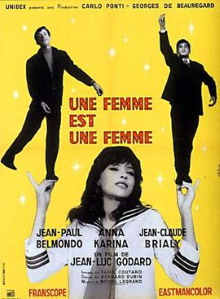As a big fan of Jacques Demy’s musicals, I’ve had this musical by Jean-Luc Godard on my to watch list for a while now. This is one of Godard’s earliest films though and not considered among the best. Indeed it plays off the musical aspects as a kind of joke and even the title is a silly bit of wordplay. Underneath the absurdity the plot is rather straightforward and readily accessible. I enjoyed its sense of fun and humor and as well as how it puts the romantic couple in an entirely mundane domestic context but it’s also deliberately designed to frustrate fans of traditional musicals.
The beautiful Angéla lives with her boyfriend Émile in a small flat in Paris. Their friend is Alfred who hangs around doing nothing and constantly reneges on his debts. He also keeps pleading for Angéla to leave Émile to be with him instead but the couple seems to treat his entreaties as a sort of joke. Émile works in a bookshop but as that modest salary isn’t enough to live on, Angéla also works as a stripper in a club which she treats as just a regular job. One day she tells Émile that she wants a child and he replies that they’ll have one after they get married. She is unsatisfied with that answer and keeps hassling him until they have a full blown argument. Émile stubbornly refuses to give in and their domestic routine is disrupted, giving an opportunity for Alfred to butt in.
As with all films by Godard, there are any number of possible interpretations and it’s not easy to determine which one is the intended one. My own take is that it’s an anti-musical musical and an anti-romantic romance film. The film features the usual trappings of the musical romance genre: vibrantly colored clothes to make the protagonists stand out from the background, song and dance routines, playful bantering between Angéla and Émile, and so on. Yet it adamantly refuses to allow the audience to enjoy it as a musical. The music cuts out abruptly at unpredictable intervals. When Angéla gets around to perform her act and sings, the musical accompaniment turns off entirely, leaving her to sing and dance on her own with some awkwardness. It pulls the same trick with the romance. Angéla and Alfred share a smoldering moment as he finally manages to convince her that his declaration of love is serious. During that scene, a song is allowed to play in its entirety without any dialogue between the two. Yet that song is Tu t’laisses aller by Charles Aznavour and the lyrics are about a man being disgusted by the woman letting herself go and not being the young, petite girl she once was.
The main plot is deceptively domestic and even traditional after the glamor of Angéla’s introduction. She may fashionably swish through the picturesque streets of Paris and seductively tease men on the dancefloor but at home she cooks and cleans like any other housewife. Meanwhile Arthur is the suave bad boy who pulls off crazy tricks to woo Angéla but he never really has a chance even though Émile works a humble job in a bookstore. The film is funny in all kinds of small ways too. When Angéla and Émile refuse to speak to one another, they argue by pointing at the words in the books scattered about their flat. Instead of properly articulating their words, they stick their toothbrush into their mouths while brushing their teeth to inaudibly express their frustration at each other. These antics end up being far more powerful expressions of intimacy and love than Arthur’s more overtly romantic gestures.
This film was a failure when it was released and even now this is considered one of Godard’s lightest works. The idea of subverting the romantic musical genre is clever but also rather superficial and I don’t believe that the faux musical aspect of it is actually well made. I’m inclined to side with the conventional view here that it’s interesting as all of the great director’s works are but it’s not a particularly noteworthy one.
